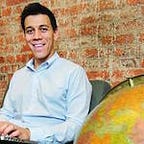Want to reach the Sustainable Development Goals? It’s time to invest in humans.
Last week, the World Bank came out with sobering news ahead of the annual “Global Goals Week”: We’re not on track to reach the United Nations Sustainable Development Goals. A report by the Gates Foundation corroborated the news, adding that “To put it bluntly, decades of stunning progress in the fight against poverty and disease may be on the verge of stalling.”
That means that by 2030, 480 million people will still be living in extreme poverty. That’s 1 out of every 17 people.
So what’s the fix?
It’s not easy, but there is still a case for optimism. The groups that are monitoring the progress of the Sustainable Development Goals tend to align on a few key points: More aid money, allocated more effectively, combined with policy changes that tackle inequality and environmental issues are needed at the institutional level.
“Yet if you’re wondering what you can do on your own to help make progress, the reports provide little guidance.”
However, buried in the report from the World Bank and Gates Foundation is some guidance that we all can act on as individuals. According to World Bank President Jim Yong Kim, “But if we are going to end poverty by 2030 we need much more investment, particularly in building human capital.”
Not technology, rocket ships, or mobile apps — we need to invest in humans. The Gates Foundation makes the same claim:
“This means investing in young people. Specifically, it means investing in their health and education, or what economists call ‘human capital.’”
So how can you invest in your fellows humans? The #SDGSandME mini series provides some very structured recommendations across the personal, philanthropic, political, and professional avenues of your life — but the latest reports provide some additional guidance, too:
1. Invest in healthcare so people have opportunities to learn
Donate, even if just a small amount, to help build health systems. As an example, as shared by the Gates report, “Rwanda, just a few years removed from genocide, has built an effective health system from the ground up and seen the steepest drop in child morality ever recorded.” Groups like Partners in Health show the life-saving impact of systems-based approaches.
2. Promote effective education
Not all education is equal, and promoting effective education is key. Programs that place higher quality teachers in primary schools (as demonstrated in Vietnam), personalize education for students (like Pratham’s Teaching at the Right Level), and increase access to secondary education for girls (MacArthur Foundation shares some highlights).
3. If you have skills, gives skills
According to Gates, “If we invest in human capital today, young people wearing sandals in the poorest, fastest-growing countries will be riding bicycles tomorrow — and inventing cheaper, cleaner, safer cars next week. That’s good for everyone.” In addition to empowering youth to and through primary, secondary, and collegiate education levels, we also need to invest in professional education to help create entrepreneurs create local solutions and jobs for the opportunities where they live. Programs, like Experteering, that foster the transfer of professional skills to local changemakers help empower locals to create their own impact and jobs.
4. Develop partnerships
There is another conspicuous takeaway in the reports, which is usage of the word “partnership”. All reports that we’ve come across highlighting progress for the SDGs mention the need for partnership. Events like Pyxera’s Global Engagement Forum couldn’t come at a better time to show stakeholders how to partner around key issues, while research-backed lessons for more effective “network leadership” provide models for how cross-sector organizations can more effectively partner together for long-term impact.
In Summary
The Gates report ends on an optimistic note, and it’s one we share at MovingWorlds: humans may have created poverty and inequality, but we can solve for it, too. To echo World Bank President Jim Yong Kim, investments in humans are investments in a sustainable planet free from inequalities and injustices.
